- Home
- Stephen Hunter
Time to Hunt Page 7
Time to Hunt Read online
Page 7
“Okay,” he finally said, “I ought to be getting back. We may be on alert. If not, can I come by tomorrow?”
“I’ll try and break off tomorrow if nothing’s happening here. We don’t even know ourselves what’s going on. They say we’re going to march to the Pentagon over the weekend. More theater.”
“Please be careful.”
“I will.”
“I’ll figure out what we have to do to get married legally. It might be better to hide it from the Corps. They’re all assholes. Then after it’s done, the paperwork will catch up to us.”
“Donny, I love you. Ever since that date when you were with Peggy Martin and I realized I hated her for being with you. Ever since then.”
“We will have a wonderful life. I promise.”
Then he saw someone approaching him swiftly. It was Trig, with Peter Farris and several other acolytes following in his wake.
“Hey,” he called, “it just came over the radio. The Military District of Washington has just declared a full alert and all personnel are supposed to report to their duty stations.”
“Oh, shit,” said Donny.
“It’s beginning,” said Julie.
CHAPTER FIVE
A flare floated in the night. Lights throbbed and swept. The gas was not so bad now, and the mood was generous, even adventurous. It had the air of a huge camp-out, a jamboree of some sort. Who was in charge? Nobody. Who made these decisions? Nobody. The thing just happened, almost miraculously, by the sheer osmosis of the May Tribe.
At the Pentagon almost nothing had happened. It was all theater. By the time Julie and Peter and their knot of Arizona crusaders actually got onto government property, the word had come back that the Army and the police weren’t arresting anybody and they could stand on the grass in front of the huge ministry of war forever and nothing would happen. It was determined by someone that the Pentagon itself wasn’t a choke point, and it made more sense, therefore, to occupy the bridges before the morning rush hour and in that way close down the city and the government. Others would besiege the Justice Department, another favorite target of opportunity.
So now they marched along, past the big Marriott Hotel on the right, toward the Fourteenth Street Bridge just ahead. Julie had never seen anything like this: it was a movie, a battle of joy, a stage show, every pep rally and football game she had ever been to. Excitement thrummed in the moist air; overhead, police and Army helicopters buzzed.
“God, have you ever seen anything like this?” she said to Peter.
He replied, “You can’t marry him.”
“Oh, Peter.”
“You can’t. You just can’t.”
“I’m going to marry him next week.”
“You probably won’t be out of jail next week.”
“Then I’ll marry him the week after.”
“They won’t let him.”
“We’ll do it secretly.”
“There’s too much important work to be done.”
They passed the Marriott, maybe fifty abreast and a half-mile long, a mass of kids. Who led them? A small knot at the front with bullhorns of the People’s Coalition for Peace and Justice; but more realistically, their own instincts led them. The professional organizers merely harnessed and marginally directed the generational energy. Meanwhile, the smell of grass rose in the air, and the sound of laughter; now and then a news helicopter would float down from the sky, hover and plaster them with bright light. They’d wave and dance and chant.
ONE, TWO, THREE, FOUR
WE DON’T WANT YOUR FUCKING WAR
or
HO, HO, HO CHI MINH
N-L-F IS GONNA WIN
or
END THE WAR NOW
END THE WAR NOW.
That’s when the first tear gas hit.
It was acrid and biting and its overwhelming power to disorient could not be denied. Julie felt her eyes knit in pain, and the world suddenly began to whirl about. The air itself became the enemy. Screams rose, and the sound of panic and confusion spread. Julie dropped to her knees, coughing hard. Nothing existed for a second but the pain searing her lungs and the immense crushing power of the gas.
But she stayed there with a few others, though Peter had disappeared somehow. The evil stuff curled around them, their eyes now gushing tears. But she thought: I will not move. They cannot make me move.
Suddenly someone arrived with a bucket full of white washcloths soaked in water.
“Breathe through this,” he screamed, an old vet of this drill, “and it won’t be so hard. If we don’t break, they’ll fall back. Come on, be strong, keep the faith.”
Some kids fell back, but most just stood there, trying to deal with it. Someone—no one could ever say who or why—took a step forward, then another one, and in a second or so those that remained had joined. The mass moved forward, not on the assault and certainly not to charge, but just out of the conviction that as young people nothing could deter them because they were so powerful.
As Julie moved she saw ahead a barricade of DC police cars, their lights flashing, and behind them Army soldiers, presumably a contingent of the 7,500 National Guardsmen called up to much hoo-hah in the newspapers. They had an insect look, their eyes giant, their snouts long and descending, like powerful mandibles, their flesh black. The masks, she realized. They were wearing gas masks, all of them. This infuriated her.
“You are warned to disperse!” came an amplified voice. “You are hereby warned to disperse. We will arrest those who do not disperse. You do not have a parade permit.”
“Oh, like that’s really crucial,” said someone with a laugh. “Shit, if I’d realized that I never would have come!”
A helicopter floated overhead. To the right, over the Potomac, the sun began to rise. It was about six, Julie saw, looking at her watch.
“Keep moving!” came a cry. “One, two, three, four, we don’t want your fucking war!”
Julie hated to curse; she hated it when Donny cursed, but standing there in the astringent aftermath of the gas, her eyes bawling, her heart knotted in anger, she picked it up and was not alone.
ONE, TWO, THREE, FOUR
WE DON’T WANT YOUR FUCKING WAR
It was like an anthem, a battle cry. The kids that were left took their strength from it and began to move more quickly. They came together in the strobing lights of the police cars and the running lights of the circling copters. Those who’d fled regained their heroism, stopped and, moved by the strength of the few who remained, turned and themselves began to march.
Pop! Pop! Pop!
More CS gas canisters came at them from the barricade, evil little grenades spurting viscous clouds of the stuff as they bounced. But the kids now knew it wouldn’t kill them and that the wind would come to thin it out and take its sting away.
ONE, TWO, THREE, FOUR
WE DON’T WANT YOUR FUCKING WAR
Julie screamed with all her strength. She cried for pale, poor Donny in his hospital bed, a sack of plasma over him, his face drawn, his eyes vacant because of the death that had passed through him. She screamed for the other boys in that awful place, without legs or hopes, faces gone, feet gone, penises gone; she cried for the girls she knew would be bitter forever because their fiancés or brothers or husbands had come home in plastic bags dumped in wooden boxes; she cried for her father who preached of “duty” but himself had sold insurance through World War II; she cried for all the beaten kids in all the demonstrations in the past seven years; she cried for the little girl running from the napalm cloud, naked and afraid; she cried for the little man with his hands tied behind him who was shot in the head and fell to the ground, squirting blood.
ONE, TWO, THREE, FOUR
WE DON’T WANT YOUR FUCKING WAR
They were all moving forward now, hundreds, thousands. They were at the police cars, they were beyond the police cars, the police were fleeing, the National Guard was fleeing.
“Hold it! Hold it, goddammit!” someone was
shouting as the melee halted. Before them was clear bridge, all the way to the Jefferson Memorial. In the rising light, the Capitol stood before them, and over some trees the spire of the Washington Monument and off to the right the Alphaville Blocks of the new HEW complex. But there were no cars anywhere, and no cops.
“We did it,” somebody said. “We did it!”
Yes, they had. They had taken the bridge, won a great victory. They had driven the state away. They had claimed the Fourteenth Street Bridge for the Coalition for Peace and Justice.
They had won.
“We did it,” someone was saying next to her; it was Peter.
“NCOs and squad leaders up front ASAP. NCOs and squad leaders up front ASAP!”
The men milled loosely on the broad esplanade of closed-down Route 95 about a half mile on the DC side of the Fourteenth Street Bridge, behind a barricade of jeeps, police cars, deuce-and-a-halfs. Jefferson watched in marble splendor from the portside, amid a canopy of dogwoods and from behind a cage of marble columns. A pale lemon sky oversaw the scene, and helicopters fluttered through it, making far more noise than their importance seemed to warrant. It looked like a fifties movie, the one where the monster has attacked the city and the police and military set up barricades to impede its progress while in some lab, white-coated men labor to invent a secret weapon to bring it down.
“Napalm,” said Crowe helpfully. “I’d use napalm. Kill about two thousand kids. Roast ’em nice and tasty-chewie. Make Kent State look like a picnic. Boy, the war’d be over tomorrow.”
“Don’t think the lifers haven’t thought of it,” said Donny, as he left to head for the command conference.
He slipped away from Third Squad, slid through other squads and platoons of young men festooned comically for war, exactly as he was, who seemed to feel equally foolish with the huge pots banging on their heads. That was the odd thing about a helmet: when it’s not necessary, it feels completely ludicrous; when it is necessary, it feels like a gift from God. This was one of the former occasions.
Donny reached the informal conclave where the barracks commander stood with three men in jumpsuits that said JUSTICE DEPT on the back, some other officials, cops, firemen and some confused DC Guard officers, of whom it was said their panic had led to the rout on the bridge.
“All right, all right, people,” the colonel said. “Sergeant Major, all of ’em here?”
The sergeant major made a quick head count of his NCOs and from each man received a nod to signify that the men under him had arrived; it was done professionally in about thirty seconds.
“All present, sir.”
“Good,” said the colonel, climbing into a jeep to give him elevation over his subordinates, and speaking in the loud, clear voice of command.
“All right, men. As you know, at 0400 hours a large mass of demonstrators commandeered the right-hand span of the Fourteenth Street Bridge, effectively closing it down. The traffic is tied up back beyond Alexandria. The other bridges have been cleared by this time, but we’ve got a choke point. The Department of Justice has requested the Marine Corps to assist in clearing the bridge, and we’ve been authorized by our command structure for that mission. So let me tell you what that means: we will clear the bridge, we will do it quickly and professionally and with a minimum of force and damage. Understood?”
“Aye, aye, sir,” came the cry.
“I want A Company and B Company formed up line abreast, with Headquarters Company in reserve to go by squads to the line as needed. We do not have arrest powers and I do not want any arrests made. We will advance under cover of moderate CS gas with bayonets fixed but sheathed. Under no circumstances will those bayonets be used to draw blood. We will prevail not by force but by good order and solid professionalism. A DC Police mass-arrest unit will follow behind, detaining and shipping those demonstrators who do not disperse. Our limit of advance will be the far end of the bridge.”
“Live ammo, sir?”
“Negative, negative, I say again, negative. No live ammo. Nobody will be shot today. These are American kids, not VC. We will move out at 0900. Company commanders and senior NCOs, I want you to hold a quick meeting and get your best squads into the line at the point of contact. This is a standard DOD anti-riot drill. All right, people, let’s be professional.”
“Dismissed!”
Donny made it back to his squad, as around him other squad leaders were reaching their people. With the weird sensation of a large herbivore awakening, the unit was picking itself up, beginning to form up as each smaller element got instructions. There was some cheering, moderated by ambiguity, but nevertheless a simple expression of the soldier or Marine’s preference for doing anything rather than nothing.
“We’ll be in that arrow-formation, platoons-abreast thing,” Donny explained. “The sergeant major will be counting cadence.”
“Bayonets?”
“On but sheathed. Minimum force. We’re moving these people out of here by our presence. No ammo, no clubbing, just solid Marine professionalism, got it?”
“Masks?”
“I said masks, Crowe, weren’t you listening? Some CS will be fired.” He looked about. The sergeant major had set up a hundred yards beyond the trucks and now the Marines were streaming to him to form up at the line of departure. Donny looked at his watch. It was 0850.
“All right, let’s assemble and march to position. Form up on me, now!” His men rose to him and found their places. He marched them at the double time to a formation that was putting itself together on the broad white band of empty highway.
Peter held her hand. He was pale but determined, his face still teary from the gas.
“It’ll be okay,” he kept saying, almost more to himself than to her. There was something so sad about him, she had a tender impulse to draw him toward her and comfort him.
“All right,” came the amplified voice, “WTOP has a camera in the sky and we’ve just heard that the Marines are forming up to come and move us.”
“Oh, this is going to be merry,” said Peter. “The Marines.”
“I want to counsel everybody; you don’t want to resist or you may get clubbed or beaten. Don’t yell at them, don’t taunt them. Just go limp. Remember, this is your bridge, it’s not theirs. We’ve liberated it. We own it. Hell, no, we won’t go.”
“Hell, no, we won’t go,” repeated Peter.
“That’s the evil part,” Julie said bitterly. “They don’t come themselves, the guys in the offices who make it happen. They send in Donny, who’s just trying to do his job. He gets the shitty end of the stick.”
But Peter wasn’t listening.
“Here they come,” he said, for ahead, out of the blur, they could now see them drawing ever closer in a phalanx of rectitude and camouflage: the United States Marine Corps advancing at the half-trot, rifles at the high port, helmets even, gas masks turning them to insects or robots.
Hell, no, we won’t go! came the chant, guttural, from the heart. Marines, go home! Then again, Hell, no, we won’t go!
The unit advanced at the half-trot, to the sergeant major’s urgent cadence, Hup-two-THREE-four, Hup-two-THREE-four, and Donny’s squad stayed tight in the crowd-control formation, a little to the left of the point of the arrow.
Jogging actually helped Donny feel a little better; he settled into a steady rhythm, and the constellation of equipment bounded sloppily on his body. His helmet banged, riding the spongy straps of the helmet liner with a kind of liquid mushiness. He felt the sweat run down inside his mask, catch irritatingly at his eyelashes, then flood into his eyes. But it didn’t matter.
Through the lens of his mask the world seemed slightly tarnished, slightly dirty. Ahead, he could see the mass of demonstrators sitting on the bridge as if it were theirs, looking fiercely at them.
Hell, no, we won’t go! alternating with Marines, go home! Marines, go home! rose to fill the air, but it sounded tinny and idiotic. They closed on the crowd until but fifty yards away, then the sergeant maj
or’s yell reached out to stop them.
“Ready, Halt!”
The two young Americas faced each other on the bridge. On the one side, about two thousand young people, ages fourteen through possibly thirty, most around twenty, college America, the nonconformism of complete conformism: all wore jeans and T-shirts, all had long, flowing, beautiful hair, all were pale, intense, high on grass or sanctimony, standing and drawing strength from one another under a bristle of placards that proclaimed PEOPLE’S COALITION FOR PEACE AND JUSTICE and other, ruder signs, like GIS, JOIN US! or STOP THE WAR! or FUCK THE WAR! or RMN MUST GO!
The other America, 650 strong, wore the green twill of duty, three companies of Marines, average age twenty also, armed with unloaded rifles and sheathed bayonets. They were earnest and, behind the rubber and plastic of their masks, clean-shaven and short-haired, yet in their way just as conflicted and just as frightened as the kids they faced. They were essentially the same kids, but nobody noticed. Behind them were cop cars, ambulances, fire engines, deuce-and-a-halfs, their own Corpsmen, news reporters, Justice Department officials. But they were the ones out front.
A man in the blue jumpsuit of the Justice Department stepped beyond the Marine formation. He had a bullhorn.
“This is an illegal parade. You do not have a parade permit. You are hereby ordered to disperse. If you do not disperse, we will clear the bridge. You are hereby ordered to disperse.”
“Hell, no, we won’t go!” came the response.
When it had died down after a sweaty bit, the Justice official reiterated his position, adding, “We will commence with CS gas operations in two minutes and the Marine Corps will move you out. You are hereby ordered to disperse!”
A moment of quiet followed and then a young man stepped forward, screamed, “Here’s your fucking parade permit!” then pivoted smartly, bent, and peeled down his jeans to reveal two white half moons of ass.

 Point of Impact
Point of Impact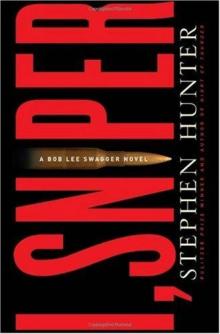 I, Sniper
I, Sniper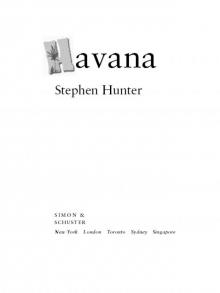 Havana
Havana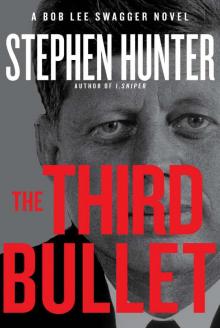 The Third Bullet
The Third Bullet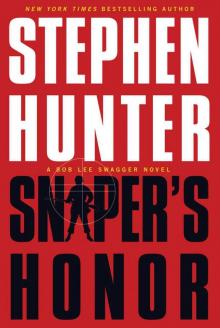 Sniper's Honor: A Bob Lee Swagger Novel
Sniper's Honor: A Bob Lee Swagger Novel Dirty White Boys
Dirty White Boys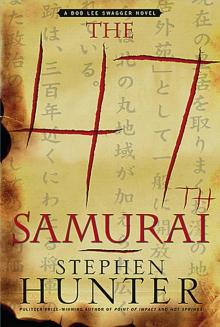 The 47th Samurai
The 47th Samurai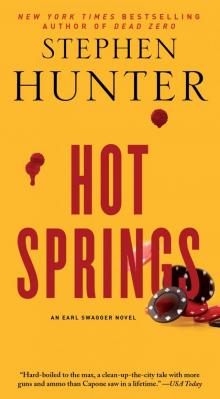 Hot Springs
Hot Springs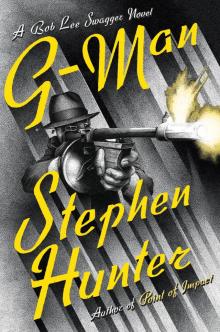 G-Man
G-Man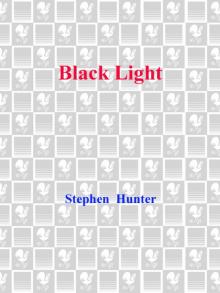 Black Light
Black Light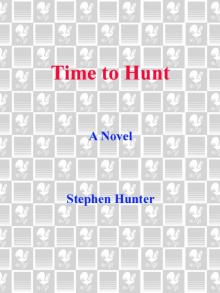 Time to Hunt
Time to Hunt The Day Before Midnight
The Day Before Midnight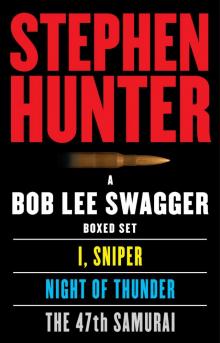 A Bob Lee Swagger Boxed Set
A Bob Lee Swagger Boxed Set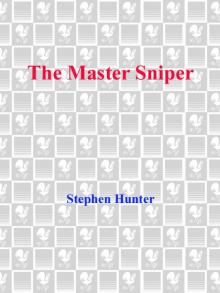 The Master Sniper
The Master Sniper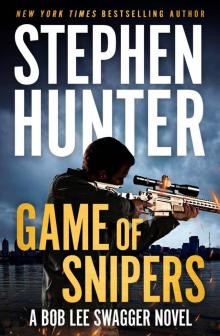 Game of Snipers
Game of Snipers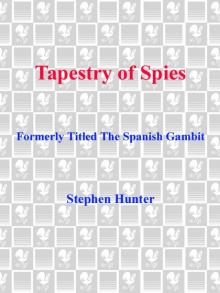 Tapestry of Spies
Tapestry of Spies Citadel
Citadel The Second Saladin
The Second Saladin Stephen Longacre's Greatest Match
Stephen Longacre's Greatest Match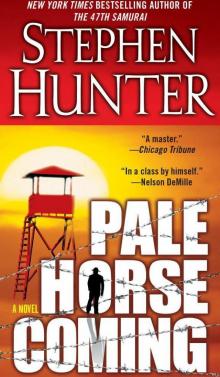 Pale Horse Coming
Pale Horse Coming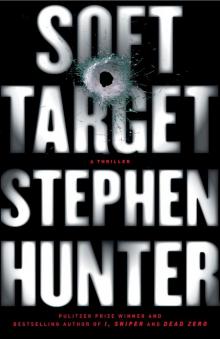 Soft Target
Soft Target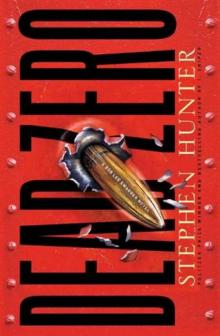 Dead Zero
Dead Zero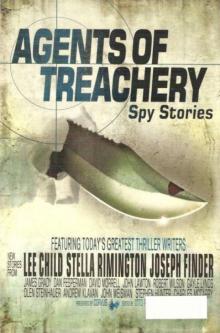 Casey at the Bat
Casey at the Bat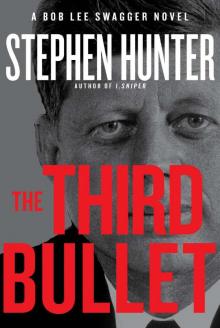 The Third Bullet bls-8
The Third Bullet bls-8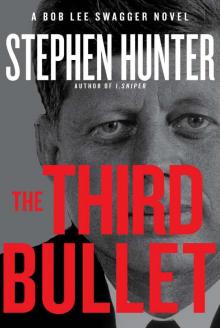 The Third Bullet: A Bob Lee Swagger Novel
The Third Bullet: A Bob Lee Swagger Novel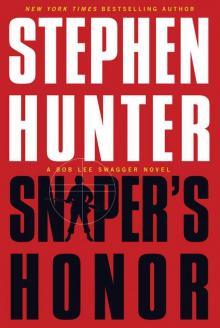 Sniper's Honor
Sniper's Honor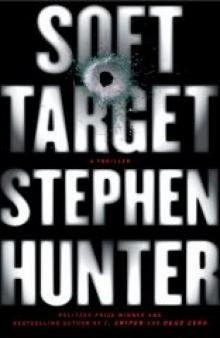 Soft target rc-1
Soft target rc-1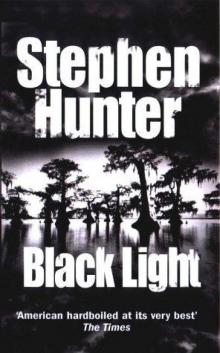 Black Light bls-2
Black Light bls-2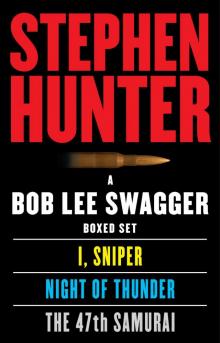 A Bob Lee Swagger eBook Boxed Set: I, Sniper, Night of Thunder, 47th Samurai
A Bob Lee Swagger eBook Boxed Set: I, Sniper, Night of Thunder, 47th Samurai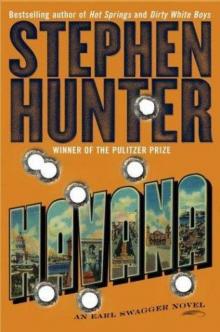 Havana es-3
Havana es-3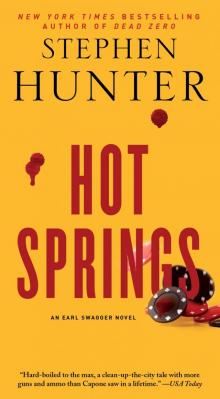 Hot Springs (Earl Swagger)
Hot Springs (Earl Swagger)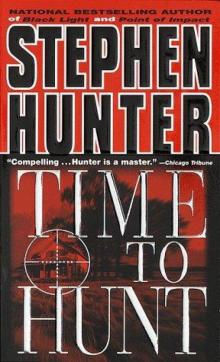 Time to Hunt bls-1
Time to Hunt bls-1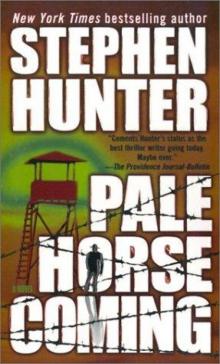 Pale Horse Coming es-2
Pale Horse Coming es-2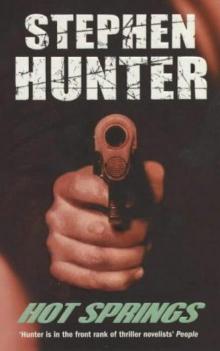 Hot Springs es-1
Hot Springs es-1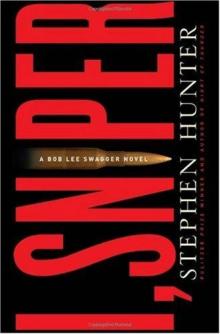 I, Sniper: A Bob Lee Swagger Novel
I, Sniper: A Bob Lee Swagger Novel